‘It’s About Survival’: Local Residents, Healthcare Workers Fight Medicaid Cuts
News Based on facts, either observed and verified directly by the reporter, or reported and verified from knowledgeable sources.
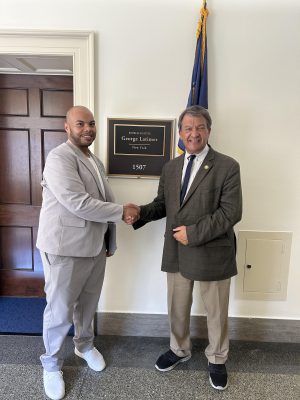
By Ava McGinty
For healthcare worker Ruben Bastell, the threat of Medicaid cuts isn’t just professional—it’s personal.
The proposed reductions strike at the heart of his own family’s story.
“My little brother was born with a kidney disease in 2000,” explained Bastell, a senior medical lab technician at Westchester Medical Center and a Rye Brook resident. “He is now 24 years old, and he is able to live a full life because of Medicaid.”
When Bastell heard about the looming cuts, he thought about his little brother and other kids that were his age when he was diagnosed.
“I felt it was important to come and fight against these cuts because if he was not able to get diagnosed when he did, he would not be alive today possibly,” Bastell said.
Earlier this month, the Civil Service Employees Association Local 860 member traveled to Washington, D.C., to advocate on the issue, meeting with Democratic Congressman George Latimer, and sharing his concerns about the Medicaid cuts proposed in the House Republicans’ “Big, Beautiful Bill.”
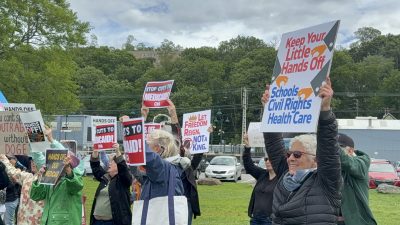
Riverside Rally
Bastell is far from alone among local residents and healthcare workers raising grave concerns about deep Medicaid reductions. On May 31, more than 100 people gathered at Ossining’s Louis Engel Waterfront Park by the Hudson River to rally against the cuts.
Beyond President Donald Trump, much of the frustration was directed at local Republican Congressman Mike Lawler, who represents the 17th District.
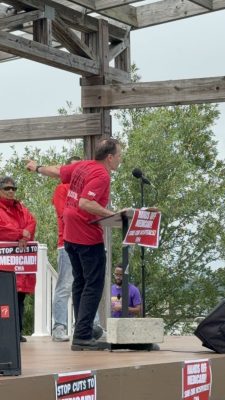
“We need you to be so loud that Mike Lawler on the other side of that river can hear you and know that you are pissed off,” exclaimed Joe Mayhew, an event organizer and Communication Workers of America Union member, as attendees participated in call and response chants.
Activists said the goal was not only to raise awareness but also to mobilize attendees for action.
“We want to give people an opportunity to come together, to express their anger, and figure out what they can do next,” said Jennifer Cabrera, an Ossining resident and member of the Working Families Party’s Westchester-Putnam Chapter.
The event drew a crowd of concerned residents carrying signs that read “Stop cuts to Medicaid,” “Hands off our Healthcare,” and “Save our Democracy,” among others.
Throughout the rally, people joined in chants like “Show me what democracy looks like,” with participants responding, “This is what democracy looks like!”
Survival
While issues like education, Medicare, and Social Security were discussed, most of the conversation focused on proposed Medicaid reductions and how massive cuts could impact hospitals and people who depend on related services.
Many of the attendees had direct, personal connections to the issue. Cabrera, for instance, spoke of her father-in-law, who became paralyzed and relied on Medicaid in his final years.
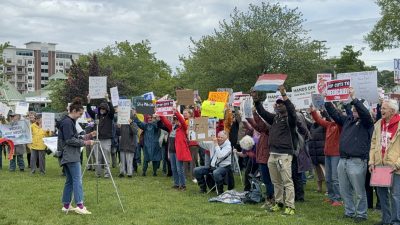
“The only way he was able to survive for years after that was through Medicaid,” she said. “Medicaid paid for a home health aide so he could stay at home longer. It paid for, once he could not stay home, for a nursing home that was close to where he lived.”
That personal impact was echoed by other speakers who reflected on the broader consequences for immigrant families, older adults, and essential workers.
Alex Pierre, who works at Good Samaritan Hospital in Suffern, told the crowd about a cousin who depends on Medicaid “from when he wakes up until he falls asleep” because he uses a wheelchair.
“People rely on Medicaid not just for doctors’ visits but for daily survival,” said Pierre, a 1199SEIU Member Political Organizer and Patient Care Partner.
Local Lawmakers
Westchester County Legislator Emiljana Ulaj, who came to the United States as a child refugee from Albania, said her family’s stability was made possible by a union job her father held after arriving in the area.
“Because of that union job, we had health care,” she said. “We had the stability that let us build a life here.”
Other elected officials at the event included Ossining Mayor Rika Levin, Ossining Supervisor Liz Feldman, and State Assemblymember Dana Levenberg, who also spoke at the rally.
They warned that the legislation would cut $900 billion from Medicaid over the next decade. Advocates at the rally said those cuts could lead to job losses and lost access to care for some of the state’s more vulnerable residents.
Organized groups including the Westchester-Putnam Central Labor Body, New York State United Teachers, 1199 Service Employees International Union (SEIU), Communication Workers of America (CWA), Make the Road Action, CCoHOPE, and the Westchester-Putnam Chapter of the Working Families Party were also present.
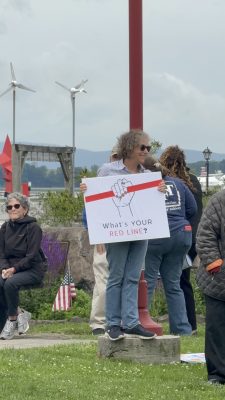
‘Do Not Comply’
Emily Feiner, a Nyack-based social worker and the first speaker of the event, was the constituent controversially removed by law enforcement from Lawler’s Congressional Town Hall on May 5.
“When authoritarianism comes for your democracy: do not comply,” Feiner asserted. She also said Lawler “needs to understand that the billions of dollars in cuts to Medicaid he has voted for three times now will affect all New Yorkers, not just those on Medicaid.”
Speakers, including Levenberg, emphasized the urgency of the situation.
“This legislation is unconscionable and cannot be allowed to pass,” Levenberg said. “I urge the Senate to reject it.”
She also criticized the bill’s structure, saying it “cuts various exemptions that allow hundreds of thousands of New Yorkers to obtain Medicaid coverage.”
At the same time, she added, the legislation “permanently extends state tax exemptions and other tax breaks that disproportionately benefit the richest Americans.”
The rally concluded with a call to action. Mayhew held up a sign encouraging attendees to text “FIGHT BACK” to a number that would sign them up for alerts. Those who joined received a reminder urging them to contact Lawler’s office and “tell him no more cuts,” said Cabrera.
The Arc Mid-Hudson
Medicaid provides support for people with intellectual and developmental disabilities (IDD), helping them live independently and participate in their communities.
The Arc Mid-Hudson is a nonprofit organization serving about 1,000 people with IDD. Its Carmel campus offers respite, vocational, day habilitation, and residential programs.
Zach Disador, who grew up in Brewster, started working at The Arc Mid-Hudson two decades ago for a summer job and is now a direct support professional and frontline supervisor. He oversees a staff of seven and runs various programs.
The respite program can begin for individuals around seven years old and continue throughout their lives. It is especially helpful for school-aged children whose parents work, offering reliable services to families.
The Arc Mid-Hudson relies heavily on Medicaid, with about 92 cents of every dollar in its budget coming from Medicaid funding, explained Disador.
As a constituent and Medicaid provider, Disador shared serious concerns about how proposed cuts could impact the people he serves.
“We’re only as strong as our most burnt-out staff,” Disador said. “That means if no staff shows up at the house or that’s very low staffing, there’s no outings that can be done, whole parts of their life are completely shut down.”
Without outings and trips, people in the program may struggle to meet community integration goals, which is key to helping them gain independence.
The Arc Mid-Hudson was formerly the Arc of Putnam until a merger in the summer of 2019.
“I think you might almost see like mega agencies be created,” Disador worried. “Which, you know, in Putnam has been a struggle for our families because a lot of times the families that we serve will want to speak to someone in Putnam, who knows their individuals,” added Disador, also noting that the agency is doing a good job at addressing these issues.
Larger agencies can be more efficient in some cases, but they may also provide less personalized service. Many families in smaller counties depend on close, consistent relationships with local staff who know their loved ones well.
For Disador, while “yes, it is about money,” most importantly, “it’s going to be the quality of life.”
Disador also emphasized the broader economic role Medicaid-funded programs play in local communities.
“Every one dollar invested into a Medicaid-funded program contributes about $2.78 back into the communities it serves,” he said. “The Arcs are often among the top three employers in each county. Our programs also support local businesses. We go out into the community, we take trips, we spend money. If those are cut, it creates a domino effect that hurts local economies and chambers of commerce.”
Disador also said the impact of Medicaid cuts would ripple far beyond the individuals he works with, threatening care for some of the region’s most vulnerable residents.
“Medicaid should be the first and foremost because it’s not just the, you know, my community that’s going to suffer,” he remarked. “[It’s] the special needs community that’s going to suffer. It’s going to be the elderly. It’s going to be the poor. This is going to disproportionately affect the most needy.”
Lawler
At his third congressional town hall event, hosted in Mahopac on June 8, Lawler faced many questions about the proposed Medicaid cuts.
Mayhew, the Engel park event organizer, was in attendance. In fact, Mayhew was on Medicaid himself 40 years ago following his honorable discharge from the Air Force. He said if the 80-hour-a-month work requirement had been in place then, he may not have been able to meet it as he was struggling to find work.
The military veteran expressed concern for relatives of his who are currently on Medicaid and struggling to find employment, concerned they could lose their benefits if unable to meet work requirements.
“The people who Medicaid is intended for long term are those within the IDD community,” Lawler countered. “Nothing on traditional Medicaid is touched in this bill. The bottom line is, of the three million people who are able-bodied and not working, the objective is to get them into the workforce. The objective is to get them into school, to volunteer in an organization.”
Lawler tried to assure residents that the work requirements to receive Medicaid may be waived for those who can prove they are actively searching for work or are ill.
The second-term Rockland Republican, representing a competitive swing district, has backed the Trump-backed bill while also presenting himself as a political moderate.
In a press release on June 16, Lawler reacted to a draft of the “Big, Beautiful Bill” that the Senate released, pushing the state and local tax cap back down to $10,000.
“After engaging in good faith negotiations, we were able to increase the cap on SALT from $10,000 to $40,000,” the congressman stated. “That is the deal, and I will not accept a penny less. If the Senate reduces the SALT number, I will vote NO, and the bill will fail in the House.”
Back to Bastell
As for Bastell, he reiterated his concern about how cuts could delay critical lab testing at Westchester Medical Center.
“Less funding will lead to delayed testing, delayed diagnoses and the doctors really rely on those to treat their patients,” Bastell said.
He explained that if hospitals are forced to outsource more testing due to a lack of funds, patients could see turnaround times double. That delay, he said, doesn’t just mean waiting longer for results. It could also mean missed windows for early detection and preventative care.
But despite all of his worries, after meeting with Latimer, Bastell said he’s feeling cautiously optimistic about the political pushback to the GOP plan.
“I am more hopeful for the future,” he said. “I think we have some people that are going to back us against these cuts and hopefully Congress will listen to us and hear our voices, because this is really important for the communities we serve.”

Examiner Media – Keeping you informed with professionally-reported local news, features, and sports coverage.
